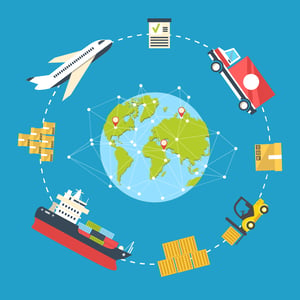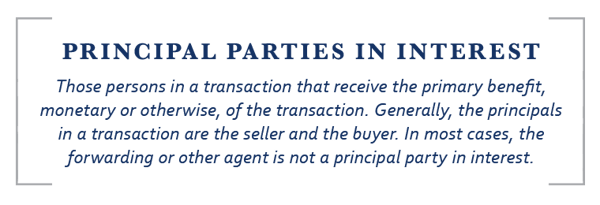 In my former life as an export agent, I dreaded getting calls from a supplier who was shipping under a “Routed Transaction.” In most cases, the supplier would insist that they did not have any obligations to provide any information. They thought that when the terms were Ex Works (EXW), they could say “we fulfilled our obligations; please pick up the freight.”
In my former life as an export agent, I dreaded getting calls from a supplier who was shipping under a “Routed Transaction.” In most cases, the supplier would insist that they did not have any obligations to provide any information. They thought that when the terms were Ex Works (EXW), they could say “we fulfilled our obligations; please pick up the freight.”
From there, I would then need to explain who the US Principal Party in Interest (USPPI) is, what its obligations were under the Foreign Trade Regulations (FTR), and how that is different from the Export Administration Regulations (EAR). It was a good day when the supplier had heard of either set of regulations.
Granted the FTR and EAR can be confusing when it comes to Routed Transactions, but here are few things to keep in mind that may help.
-
Census is responsible for collecting trade data.
The US export trade data is collected via the Electronic Export Information (EEI). Census also shares this data with various US government agencies that are responsible for enforcing export controls. The FTR contains the requirements for filing the EEI and defines the responsible parties. Census’ interest is to collect the data; it does not recognize Incoterms®. The FTR determines who is responsible for filing the EEI.
-
The EAR and FTR have separate definitions.
Under the FTR, in Routed Transaction scenarios, the Foreign Principal Party in Interest (FPPI) must always provide written authorization to a party in the US to file the EEI on their behalf. Thus under Incoterms® FCA – where the rules clearly place responsibility for export formalities on the seller, the foreign buyer must provide someone in the US – either their freight forwarder or you - with written authorization to file the EEI on their behalf.
The use of the word “and” implies that both must apply to qualify as a routed transaction. However, during a recent Census outreach program that I attended, while Census agreed the definition needs to be revised, Census stated that this should not be inferred.
When it comes to filing the EEI, the FTR defines a “Routed Export Transaction” as “a transaction in which the FPPI authorizes a US agent to facilitate the export of items from the United States on its behalf and prepare and file the EEI.”
When your customer (the FPPI) has not provided you with written acceptance of licensing responsibility, then you are the “exporter” under the EAR and you must make the licensing determination.
Additionally, the EAR requires that the USPPI must, upon request, provide the FPPI and its agent (e.g., the buyer’s designated freight forwarder) with the correct Export Control Classification Number (ECCN), or sufficient technical detail to determine classification, and any information it knows will affect the determination of licensing authority.Responsibility includes determining licensing requirements and obtaining licensing authority. The FPPI must then retain an agent in the US to represent them as the “exporter” under the EAR.
The EAR defines an “exporter” as “the entity that has the authority of a principal party in interest to determine and control the sending of the items out of the United States.” This means that in order to not be identified as the “exporter” under routed transactions the USPPI must receive written verification from the Foreign Principal Party in Interest (FPPI)*, that the FPPI clearly assumes the responsibilities under the EAR. This is that exception for a routed transaction.
The United States Principal Party in Interest (USPPI)* is always the “exporter” under the Export Administration Regulations (EAR) – except in certain Routed Transactions. Note this does not mean in all “routed” transactions.
Clearly, selling to a foreign customer using Incoterms® that place responsibility for US export formalities on the foreign customer is more difficult than it seems.
We recommend steering clear of Routed Transactions, and leaving the responsibilities for dealing with the EAR and FTR where they may best be managed – with you.
Export consulting and EAR consulting is an expertise of ours. Turn to Tradewin if you have any hesitations about the correct steps to take.
*Terms defined in the FTR







